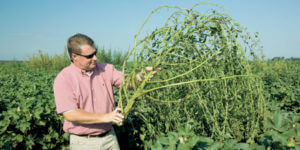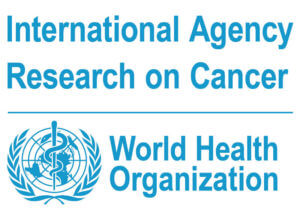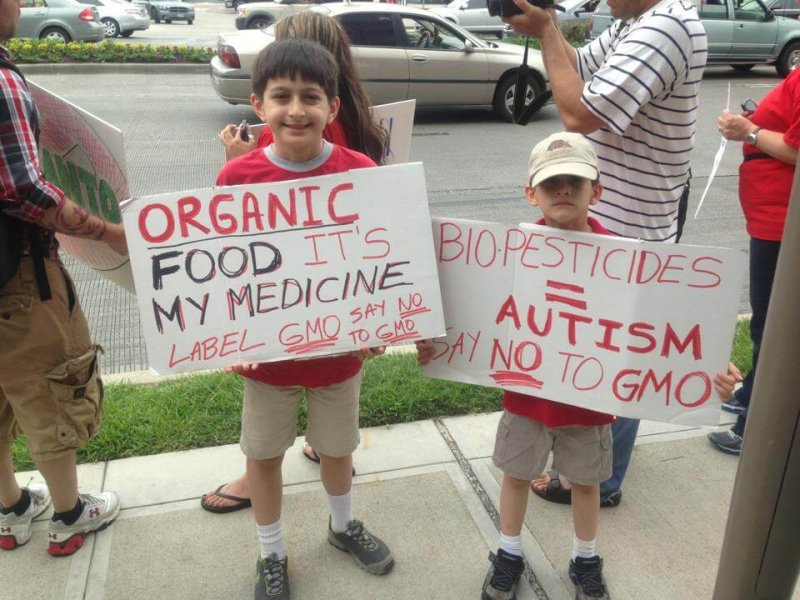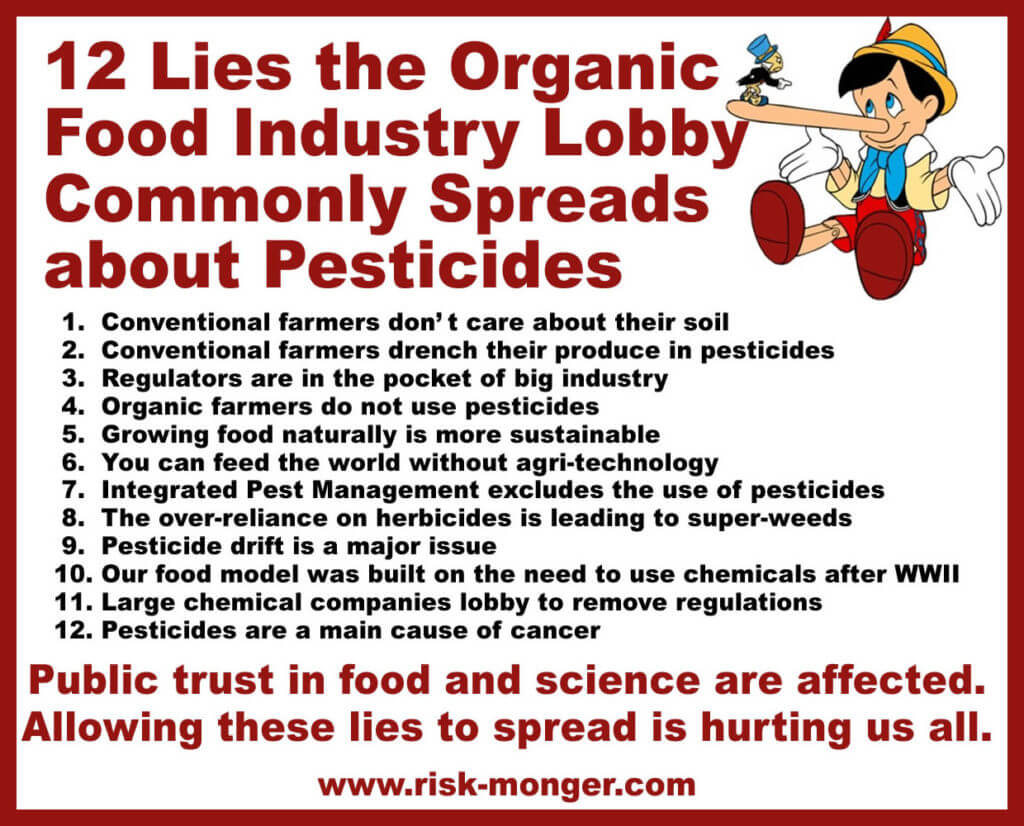How many times have we heard that healthy living means switching to organic food? Not a day seems to go by when the media isn’t humming with some scandal, risk or public health crisis involving our potential exposure to synthetic chemicals. Autism, leaky gut, obesity, celiac, cancer … all of this is due, apparently, to us finding 7 parts per billion of glyphosate residue in our bread. We are assured that these problems will all magically disappear once we join the “Buy Organic” bandwagon.
But is the organic food industry lobby, a diverse body of interest groups, food companies, foundations and gurus, lying?
Lies, damn lies and marketing!
In a recent blog, I tried to show how the “organic” label is merely used for marketing purposes and has no added value other than to make vulnerable, wealthy people feel better about their consumption. For this blog, I will ignore some of the consequences of succumbing to the organic marketing hype (increased stress organic farming causes on global food security, environmental degradation and public health pressures) and simply ask: As marketing goes on all around us, should we give it much thought if every opportunist slaps the word “organic” on their food as if it were to mean something?

Well … call me sentimental, but for me, the truth matters and I don’t think we should tolerate zealots who tell lies.
It is not so much of an issue that the entire organic business model is built on a marketing trick, but that their pro-organic message is built on a lie … actually at least twelve lies … often repeated and spread without remorse or reflection. Activists in the organic food industry lobby have made a career out of lying about the benefits of their organic label (or lying about the risks of eating conventional food).
The organic activists and operators lie in the morning, they lie at lunch, they’re lying straight through the afternoon and into the evening. These little shits probably lie in their sleep, and the next morning they get up and they tell these lies again. They are paid to lie and probably are no longer aware of it. When a court of law tells them to stop lying, they simply move on and tell lies somewhere else.
I find that behaviour morally reprehensible, because:
- the organic food industry lobbyists are telling these lies to scare consumers (and pay good money for lower quality food);
- these lies make farmers who work to supply safe abundant food look evil;
- these lies paint university plant biologists who engage with the public as corporate shills;
- these lies destroy the public trust in our regulatory system and safety in the food chain.
Simply put, these habitual lies harm all that is good about science and the progress it has made in saving lives with agri-technology.
This summer several readers on social media contacted me expressing how fed up they were with the rampant spreading of so many lies about conventional farming. Members of their families and friends were sharing posts on social media based on pure lies. They wondered whether there was a good, easy-to-read resource in which to refer these innocent retweeters in order to counteract the damage of the pro-organic slur campaigns.
Consider these twelve common lies about pesticides as my modest contribution.
Lie #1: Conventional farmers don’t care about their soil; only organic farmers do
All farmers care about the quality of their soil and work to preserve it. During a Voice of Farmers event I had organised last year, Farmer Olly Harrison explained how it had taken a thousand years for his soil to reach its present state, and he was not going to risk losing it with poor soil management practices. That is why Farmer Olly and millions of other conventional farmers are practicing reduced or zero-till farming to protect the soil. Conservation agriculture is defining a movement led by farmers seeking the best means to not only protect soil from degradation, but also to improve it.
No-till farming and complex cover crop applications have succeeded with the use of herbicides like glyphosate, allowing farmers to terminate cover crops and drill seeds without disturbing the soil. During a tour of a Conservation Agriculture farm in the UK, I learnt how multiple cover crops can feed nutrients and aerate soil while preserving moisture and biota. I know first-hand from my childhood how farmers are always working to develop better techniques, and agri-tech tools available today, like glyphosate, are allowing farmers to take soil preservation to a higher level.

Organic farmers, without the use of herbicides, are restricted from efficient cover cropping and soil nutrient management. Often they have to till the fields to reduce weeds or terminate cover crops. This not only leads to an increase in CO2 emissions (released from soil and tractors), but also reduces moisture, disturbs soil biota and leads to an increase of soil erosion (from wind and water runoff). Many one-time organic farmers have contacted me saying they were forced to decertify from organic after seeing the consequences to their land from soil erosion. Other non-herbicidal techniques they have tried, like flame weeding or continuous matting have proven to be less effective and anything but sustainable.
I find it obscene that the organic lobby not only spreads the lie that only organic farmers are concerned about their soil, but that they are succeeding in their efforts to ban glyphosate and make true soil protection through conservation agriculture practices much more difficult.
Lie #2: Conventional farmers douse or drench their produce in pesticides
We have to be aware of the scaremongering vocabulary used by activists and pro-organic lobbyists – their arguments are emotion-laden rather than fact-based so words like contamination, toxic or poison take on non-scientific lives of their own. One of the most offensive images activists present is that our food is doused or drenched in pesticides – that chemicals are literally dripping off our produce on the shelves.
I am actually impressed at how low the level of pesticides applied on our farms has become. This fiction that we are swimming in glyphosate boggles the brain. To treat an acre of farmland, you would need the equivalent of two soda cans of herbicides (most of the spray is water). But when opportunistic liars use words like drenched or doused, it is easy to imagine how vulnerable people without technical knowledge would react.
Farmers and plant biologists are finding ways to further reduce the pesticide dose levels through better spray nozzle technologies (on our farm in Canada in the 1970s, we used to have a high-pressure spray gun that would knock me off my feet), precision farming and seed treatments that avoid foliar spraying entirely. The NGOs are trying to ban seed treatments as well!
Not good enough! Activists still spread lies about how our food is drenched, doused and dripping chemicals out of factory farms and industrial agriculture. Using colourful language that misleads and creates fear is, in my books, lying.
Lie #3: Regulators are in the pocket of big industry and don’t even check if pesticides are safe
“Exist to Discredit” organisations like Corporate Europe Observatory or US Right to Know have no scientific or research credentials but rather try to undermine trust in authorities through ad hominem attacks on scientists or administrators who had, at any point in their career, been involved in projects that had engaged industry. These wolves do not read registration documents or evaluate the quality of the science behind government authorisations (that involves too many words and is too “sciency”), but rather trawl Google for evidence of scientists’ links with industry. That a scientist may have advised industry or even been employed by a company a decade ago does not discredit his or her present work or imply that the regulators are in the pocket of corporations (no matter how many times you repeat it).
As for the claim that regulators do not check if pesticides are safe – this assault on the public trust of authorities is as malicious as it is naïve. Crop protection companies need to submit thousands of pages of data (usually over a period of around ten years) in order to register a new pesticide on the market and then must meet strict compliance demands and requests for further data to keep products on the market.
Corporate Europe Observatory, who revel in claiming companies don’t provide data, were granted access to thousands of pages of research on glyphosate submitted to EFSA, only to then cry out that there was too much and they couldn’t machine read the documents or use Google to find the few ‘gotchya’ parts. The hypocrites never came back with their own evaluation on the state of industry compliance but continue to feed the “we just don’t have data” lie.
Lie #4: Organic farmers do not use pesticides or if they do, they are nice and gentle (and they only use a little)
Several years ago, I published a blog that got some attention on social media. I was shocked to see how many people refused to accept that organic produce also had pesticide residues. A UK study showed that 95% of consumers bought organic because they believed they were not ingesting pesticides. The organic lobby had done a good job making consumers afraid of conventionally farmed produce, but said nothing about their own farmers using toxic substances to protect organic food from insects, weeds and mold.
I identified the pesticide industry’s moral dilemma: if they fought back and played dirty like the organic food industry lobby, they would only make frightened people more afraid of the safety of our food supply; if, however, they stick to their ethical code of conduct and stay silent and respectful of their competition, then the power of social media to spread the organic lobby’s lies would eventually put them out of business and create chaos in global food security. Seeing the offensiveness of the organic lobby lies, from the Coop’s now banned Organic Effect campaign to Chipotle’s sick marketing scam scarecrow video to the use of children in Only Organic’s New MacDonald clip, I decided to bust that bubble of naivety. My Dirty Dozen blog has since opened the debate about what pesticides organic farmers are using, how tested they are and how toxic they are.

What I have noticed is that the organic lobby has been forced to come clean about the reality of their use of pesticides, but like all pathological liars, the bullshit is just spread more finely. First, they claim that organic pesticides are not as toxic as synthetic pesticides. This is ridiculous on so many levels – if a farmer has a pest or a fungus infestation, then they need something toxic and at the sufficient level (or they use more of it). Some organic-approved toxins like copper sulphate or azadirachtin are much more toxic to human health and the environment than synthetic compounds that achieve similar results.
Then the organic lobby try to argue that organic farmers may only apply certain amounts of chemicals in a season and at certain times, but there is no evident enforcement and the exceptions are so huge as to make this an honours promise. By the way, conventional farmers also have limits (called maximum residue levels) that are routinely controlled.
Finally, the organic lobby applies a form of categorical ambiguity with many activists denying that some of the nastier chemicals (rotenone, nicotine sulphate) are permitted, but then the lobby does not have a clear international list. Rather they will argue that this substance is not allowed for organic farming unless you are growing this or that produce in certain regions.
By creating ambiguity, I suppose you are not actually lying … you are just intentionally avoiding the need to be honest! Bottom line is that the organic food industry lobby has done its best to stop regulations on organic food. IFOAM attempted to scuttle the review of the EU Organic Food regulation – it is better not to talk about how organic should be regulated.
Lie #5: Growing food naturally is always better and more sustainable
Not everything natural is good. Ebola is natural. So is E. coli.
A recent study by the German BfR on public perceptions of risks conclude that people are much more concerned about risks from synthetic substances than natural ones. Our narrative today is built on the assumption that nature does things properly (by design?), and humanity, in all its imperfections, makes a total mess of any interventions it may attempt on nature (OK, never mind things like medicine, vaccines, shelter, food processing, transportation …). So only farming according to nature’s plan should be allowed. I have been told many times on social media that we have a lot we can learn from the Amish!
This, of course, is religion and not science (no matter how much agroecologists pretend to wear white coats). A scientist will look at all possible solutions to a problem and arrive at the most practical, efficient means. A religious person starts with a law or set of restrictions, and works from that. So anyone saying that all food must be grown using only natural inputs (fertilisers, pesticides, seeds…) is limiting the options for more efficient and sustainable agriculture.
We can see so many ridiculously unsustainable measures that the organic lobby prescribes in order to honour this religious, naturopathic taboo:
- health and environmental consequences of opting for copper sulphate instead of more benign synthetic alternatives;
- countless hectares of productive land wasted to grow chrysanthemums to produce natural-based pyrethrum pesticides when synthetic equivalents would suffice;
- wasted opportunity of the organic lobby rejecting the benefits of new plant breeding techniques which could increase food yields without pesticides;
- soil erosion and increased CO2 emissions from repeated tillage for organic farming weed control when it is evident that conservation agriculture with herbicides protect soil much more efficiently.
I could go on, and I usually do, but it is safe to say that the religiosity of these naturopaths is far from sustainable. That they promulgate lies and fear about non-natural practices is regrettable and should be treated in the same manner that we consider other dangerous and manipulative cults who lie to maintain dogmatic purity.
Lie #6: You can feed the world without agri-tech
There are so many weak manipulations to this wishful thinking. My favourite is that food waste is so substantial that we could feed the world even with 40% lower organic agricultural output if we just stopped wasting food. The logic behind this fiction is that food waste is simply that inexpensive slimy head of lettuce I carelessly left at the bottom of my fridge. Depending on the region though, around half of fruit and vegetable food waste is pre-consumer waste – food left in the fields. Much of it grew in a spoiled state that would not survive the trip to market.
If we were to switch to organic, with the higher prevalence for insect and fungal deformities, do we seriously think this waste-free food of the future will have a longer shelf-life? To the contrary, without the technologies used in food packaging and preservation, in the ideal organic world, we could expect both lower food production and higher waste rates. Sweet!
Agroecologists argue that their perfect world would produce higher nutritional values and better yields but to get there, first we need to abandon our present agricultural practices. Spoken like a true preacher! Without data, an idealist can provide all sorts of promises, but hope has never put food on my table. For agroecology to even feed its farming practitioners, an enormous amount of subsidies would be required.
Then there are the urban roof-gardens and window box farmers. These are warm, educational and provide for nice feel-good stories in The Ecologist or Mother Jones, but outside of a few side salads for local communities, I don’t see the prospect of feeding the world in this manner. What it does do is convince the innocent that farming without agri-tech is easy (Look at my window-box – no weeds!).
To be honest, I have to admit there are two ways we can feed the world without agri-tech. First, we could force the global population to adopt a vegan diet. As soy yields would collapse, vegans would have to compromise and allow for the consumption of insects (preferably genetically modified for protein enrichment and higher growth rates). As well, and there are Neo-Malthusian groups seriously looking into this, we would need to exercise a radical global depopulation process (three billion sounds like a nice benchmark). Perhaps as we will all become protein deficient (really? Not even cheese?), birth rates will decline naturally, but that will likely not be fast enough. A certain number of global famines will need to be tolerated.
There, see! Whoever said the Risk-Monger didn’t provide proactive solutions? Whom do we throw off the planet first? (Definitely not those heroic vegans!)
Lie #7: Integrated Pest Management excludes the use of pesticides
Any farmer will tell you that they would prefer not to use pesticides – it costs money, takes time and entails risks. Integrated Pest Management (IPM) is a call for farmers to try different measures in dealing with pest outbreaks. Insecticides are one tool in the farmers’ toolbox and as research continues to improve on other measures, it is hoped that pest outbreaks will diminish and reduce the need for insecticides.
We have to be vigilant, though, against this bias that anything is better than insecticides or that IPM’s goal is to move to organic farming. Recently introducing nematodes were recommended as an alternative for a certain pest treatment until it was discovered that these nematodes were infecting and hoovering up wintering bumblebee nests. I would rather see a wider use of neonicotinoids than to adopt this organic farming practice into IPM.
Lie #8: The over-reliance on herbicides is leading to an explosion of super-weeds
 Let’s start with the obvious: organic farming leads to an explosion of super-weeds. There have been recent cases in the US of authorities coming in and applying herbicides on organic farms where endemic weed infestations were spreading to neighbouring farms. Organic lobbyists like to cry foul (once again, that the authorities are in the pocket of the chemical industry), but this is the moral equivalent of the irresponsible parent bringing a baby with a highly contagious virus to a crowded creche. Keeping weeds under control is a serious business for farmers – if you lose to the weeds, you lose the land (no matter how much activist stirrers like Vandana Shiva praise super-weeds like amaranth).
Let’s start with the obvious: organic farming leads to an explosion of super-weeds. There have been recent cases in the US of authorities coming in and applying herbicides on organic farms where endemic weed infestations were spreading to neighbouring farms. Organic lobbyists like to cry foul (once again, that the authorities are in the pocket of the chemical industry), but this is the moral equivalent of the irresponsible parent bringing a baby with a highly contagious virus to a crowded creche. Keeping weeds under control is a serious business for farmers – if you lose to the weeds, you lose the land (no matter how much activist stirrers like Vandana Shiva praise super-weeds like amaranth).
The reality is that nature is one nasty beast and like the problem with antibiotic resistance, weeds evolve and some are showing signs of resisting existing pesticides. That does not mean that we should ban herbicides like glyphosate but farmers are working on finding a balance between different types of chemicals and other weed control strategies. What would be helpful would be to have an openness to authorising more herbicides (but that so ain’t gonna happen in our present European chemophobic, hazard-based regulatory climate).
The problem is not as urgent as the Chicken Littles portend. Almost 15 years ago, Marion Nestle had predicted an immanent super-weed Armageddon. To the contrary, we should marvel that, after four decades, glyphosate still maintains such a high efficiency at such low doses with very low toxicity.
The organic lobbyists spreading these super-weed lies provide no viable alternatives. Smaller farms, mulching and more hand weeding are not credible solutions. Unless we get millions of children back into the fields during the summer “weeding” vacations or change our attitudes towards immigration, lower the minimum wage and relax labor standards, these alternatives are sheer nonsense. Some weeds might be nice in a salad, but these cosmopolitan zealots have no idea what the consequences of their lies about super-weeds would entail.
More organic will mean more weed issues.
Lie #9: Pesticide drift is a major issue
Farmers know full well never to spray in windy conditions for the obvious reasons of loss of efficiency, cost and the remote possibility of drift. Couple that with the developments in nozzle precision and research into precision farming and it is clear that farming practices are moving towards using less pesticide volumes locally targeted.

Organic lobbyists love to present an image of aerial spraying (crop dusting) to raise alarm bells. These liars know full-well that aerial spraying is banned in the EU.
The recent claims of dicamba drift in the US and potential volatilisation have sparked debate on contributing factors and may require further training on mitigating procedures during application. The same issues of crop injury arose when glyphosate was first introduced. Meanwhile, the activists just maliciously label it “drift” and are sharpening their knives for a regulatory assault on dicamba post-glyphosate.
Lie #10: Our present agricultural model was built on the need to reapportion toxic chemicals after WWII
This is one of the more insidious associations that anti-chemical activists try to build – that a farmer spraying his crop is the moral equivalent to Nazis gassing Jewish Holocaust victims. This reprehensible communication trick was recently amplified when Bayer moved to take over Monsanto. I understand the panic the activists felt when faced with the loss of a money-spinning fear factor like the Big Bad Monsanto Wolf, but reminding us that Bayer was providing chemicals like Zyklon B during the second World War, was, well, disgusting and disgraceful.
For the record, the German Nazi party promoted ecological practices long before those enlightened American NGOs adopted the noble responsibility of saving the world.
Built into the bias of these lies about the re-application of nerve agents on our food is the naïve belief that chemists are incapable of developing new products or discontinuing production of existing chemicals. If this were the case, why weren’t we spreading mustard gas across our fields after World War I? Almost every episode of the recent “GMOs Revealed” lobbumentary repeated this lie that the chemical industry pushed pesticides because they needed a new market after we were forced to stop using them for genocide. This argument makes no sense (and I wish I were making this up) and was only created by malicious opportunists seeking to hurt the good people who grow our food.
The reality is that the post-war world was suffering and there was a concerted effort to increase agricultural production and efficiency as part of the Marshall Plan (after major crop failures in 1946-48). That man developed better fertilisers and found the means to combat locusts, malaria and famine is indeed a dreadful thought. Let’s tell stories of how farmers who use pesticides are modern-day genocidal maniacs instead. Shameless!
Lie #11: Large chemical companies lobby to remove regulations
In the last two decades, Europeans have seen the creation of a new professional class: career regulator (experts who have studied governance and policy in university, go straight into government upon graduation and have a native calling to regulate). In a trust-deficient environment, the benign regulator is presented as the protector of the vulnerable population, while industry, the big bad wolf in this story, is out to stop the regulator, pollute and poison the population for greed and power. What a lovely Hollywood script.
In recent battles against TTIP, activists like Corporate Europe Observatory perpetuated this myth by trying to scare Europeans that a free-trade deal with the United States would allow industry to take governments to court and, gulp, sue them for regulating. The fact that CEO and their cabal attack and take these regulators to court just makes their scaremongering all more hypocritical!
Governments, in the 1980s and 90s used to prefer not to regulate, favouring industry voluntary commitments and own initiatives. So how did we shift into this Nanny-State world of regulatory dragnets on each and every human activity? Well, let’s think out of the box. Could it be possible that big companies adapted to this New World Order and have come to welcome more cumbersome regulations?
Imagine that a small company or lab were to develop a novel new seed or crop protection product which could benefit farmers and better protect the environment. Would they have the resources, manpower and network to sustain a ten-year regulatory odyssey costing millions of euros to register the product (before getting a single penny back)? Of course not. The regulatory maze demanded by the innocent NGOs serves the big corporations just fine, keeping the competitive field down and making innovative upstarts more vulnerable to takeovers. Now, as the regulations are making compliance to keep existing pesticides on the market more costly, even the big corporations are having problems competing (hence the recent wave of consolidation in the pesticide industry). See insights during the Q&A from an event by Bruce Ames and Henry Miller (after 1:38.20).
What companies do not want, clearly, are regulations that create an unfair competitive playing field. More than a decade ago, I was one of those arguing that REACH was going to handcuff the European chemical industry and give advantages to producers outside of the EU. This is one more reason why trade agreements are important and why sad little groups like Corporate Europe Observatory exhibit so little understanding about trade and regulation.
To argue that big companies do not want regulations is not only a lie, it is quite naïve.
Lie #12: Pesticides are a main cause of cancer
Apparently Googling the word “cancer” gives you cancer. Our obsession with exposure to carcinogens (fuelled by the immediacy of social media to multiply and amplify the suffering of cancer victims within our personal networks) has created an opportunity for the organic lobby to perpetuate the lie that synthetic pesticides give you cancer (giving campaigns emotional outlets like photos of child cancer victims). So NGOs are now signing long term contracts with shady labs to test food for chemical residues to produce instant (and instantly profitable) fear campaigns; fly by night hacks are setting up urine test businesses for traces of glyphosate; and, heaven help us all, the detox industry is thriving with the abundance of cancer woo percolating around Facebook and twitter! Indeed that 6ppb of glyphosate residue in your oatmeal may not take any years off your life Carey, but worrying about it certainly will!
 The Risk-Monger spent the summer rereading and meming Bruce Ames’ writings on the highly unlikely risks to cancer from synthetic chemicals. I discovered that if you really want to plant a bee in an activist’s bonnet, stick Bruce Ames in his or her face! This highly respected and honoured toxicologist (and founder of the Ames Test which activists abuse to promote chemophobia) is full of vitriol for the activists’ campaigns against synthetic chemicals. Simply put, compared to the natural carcinogens that a plant produces to protect itself, the 0.01% of the synthetic toxins used on plants are insignificant.
The Risk-Monger spent the summer rereading and meming Bruce Ames’ writings on the highly unlikely risks to cancer from synthetic chemicals. I discovered that if you really want to plant a bee in an activist’s bonnet, stick Bruce Ames in his or her face! This highly respected and honoured toxicologist (and founder of the Ames Test which activists abuse to promote chemophobia) is full of vitriol for the activists’ campaigns against synthetic chemicals. Simply put, compared to the natural carcinogens that a plant produces to protect itself, the 0.01% of the synthetic toxins used on plants are insignificant.
There are more toxins found in a single cup of coffee than we would get from the pesticide residues from an entire year of fruit and vegetable consumption. There are in fact 1000+ natural chemicals in that cup of coffee, we have only tested 22 of them and 17 have been found to be carcinogenic to rats (… so don’t feed your rats coffee!).
What upsets Ames most about the cancer fearmongering from these lying activists is that it is doing the opposite. People are eating less fruit and vegetables out of fear, and as organic marketing increases, prices will go up, making the best means to fight cancer (at least five servings of fruit and veg a day) even harder for all but the elitist, smug foodie part of the population to achieve. This is worse than merely lying to promote a lifestyle; this is wilfully harming large parts of our population. Why are these organic lobbyists not thrown in jail for this?
Or maybe we should ban coffee!
Stop being so smug!
Many in the organic industry lobby may not like that I have called you liars (and cancer-causing thugs). I understand that – you prefer to label industry as lying cancer-causing thugs and don’t think twice about it. If you are offended by this article, it is a good indication that you have a high opinion of yourself and your food choices (and think less of others who would dare confront your choices). In other words, you are a smug elitist.
You might be able to claim that you are innocent or justified in rejecting five or six of my accusations:
- maybe you were not the ones likening farmers to Nazis gassing Holocaust victims, but you tolerate them within your tribe;
- maybe you know a conventional farmer that does not follow best practices (sure, and no organic farmers cheat?);
- maybe you accept that organic farmers also use pesticides, but you don’t correct others who spread that fiction).
Fine, believe what you want about yourselves, but that means you are still openly lying on six or seven other points. Hardly the paradigm of virtue, are you? A bit more self-honesty, a bit more reflection and a lot more humility and then just maybe I’ll stop insulting you!
David Zaruk has been an EU risk and science communications specialist since 2000, active in EU policy events from REACH and SCALE to the Pesticides Directive, from Science in Society questions to the use of the Precautionary Principle. Follow him on Twitter @zaruk
This article was originally published on The Risk Monger as Twelve Lies Organic Lobbyists Commonly Spread about Pesticides
































